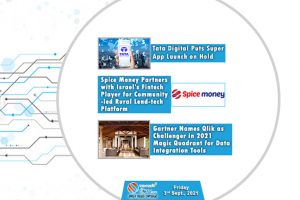Digital innovations need to be in-sync with digital adoption in healthcare
The virtual summit themed on ‘Decoding Technology Innovations in Healthcare,’ enthralled an audience of over 2500+ IT decision makers as industry-leaders gave insights on the major transformation in healthcare, which will be driven by technology and patient-centric approach
New Delhi, February 19, 2021: The recent CXO Digital Innovation Health Summit & Awards 2021, an initiative of Health Technology- A community under CXOTV NEWS fortified the fact that digital innovations can’t be segregated with digital adoption in healthcare. The healthcare thought-leaders in the 6th edition of the summit upheld that healthcare can’t shy away from technology adoption for quality healthcare delivery.
In a thought-provoking keynote address to an audience of over 1500 healthcare IT decision makers, Dr Alok Roy, Chairman and Managing Director, Medica Group of Hospitals highlighted that over the last 12 months digital has proved its importance for healthcare delivery in India. “Technology in healthcare instrumentation and pharma is fairly advanced; however, the healthcare delivery in India lags behind our counterparts in the US and UK. The most significant impediment for us to improve healthcare delivery is the cost and investment required for digitalization of processes. Covid-19 pandemic has made us realize that we can’t shy away from investing in healthcare technology.”
He further mentioned that healthcare is set for a quick rebound, which will exceed its pre-Covid levels. “Many of the patients who delayed their treatments, operations and consultations will eventually come to hospitals as the Covid situation eases with the ongoing vaccination program. However, this rebound will put a lot of burden on the hospital infrastructure. Hence, it’s time for the technology to play a larger role in making the treatments and patient care more effective and accessible.”
In fact, the recent union budget amplifies the government’s focus on healthcare. “The recent budget was much awaited and will truly set India on the stage of growth and revival to become one of the largest economies in the world. The government’s healthcare focus is further bolstered with the announcement of PM Atmanirbhar Swasth Bharat Yojana with an allocation of over Rs 64,000 crore over the next 6 years focused on rural healthcare. In addition, Rs 2.8 lakh crore for urban water mission recognizes that water is an important determinant of health,” shared Sangita Reddy, Joint Managing Director, Apollo Hospitals Group, in her keynote on the union budget for healthcare.
Indeed, with a bold budget focused on growth over deficit and special emphasis on healthcare, the $135 billion Indian healthcare industry is at an exciting tipping point. The healthcare sector is overlooking an era of major transformation, which will be driven by technology and patient-centric approach.
In her interesting keynote address on the day-2 of the summit, Dr Uma Nambiar, Chairperson, DHIndia Association and Executive Director, Gimcare Hospital, underlined that healthcare delivery needs to move from being doctor-centric to patient-centric. “The pandemic has forced us to shift care to the patient location; home-based rather than hospital care. Technology and patient data management play a crucial role in this transformation. In fact, we need to overcome the newer challenges of huge data generated from multiple sources, interoperability of data, lack of universal user interface and issues with legacy systems and data migration.” She added that the pandemic has only made the digitization even more crucial.
Further, the CXO Digital Innovation Health Summit, themed as ‘Decoding Technology Innovations in Healthcare,’ gave healthcare CXOs an opportunity to explore technology innovations and best practices across patient care, telemedicine and hospital practices.
In an interesting panel moderated by V Srinivasa Rao, Chairman and MD, BT&BT, the panellists including Rajiv Sikka, CIO, Medanta Medicity; Madhavi Kanumoory, CIO, Healthcare Global Enterprises; Animesh Roy, General Manager, Advanced Analytics and AI, Narayana Health; and Shuvankar Pramanick, CIO, Columbia Asia Hospital, discussed on how AI is changing healthcare in 2021 and beyond. Kanumoory highlighted that lot more efforts are being made for making data available for AI and analytics applications as there is no sharing of electronic health records in India. She added that the government intent is there and the efforts are being made to streamline the policies. Sikka added that policy for data sharing is in place in the form of NDHM. “In fact, various activities are being done in a sandbox where 35-40 hospitals are participating to achieve the first level of interoperability of patient information. NDHM is the first step in the direction towards exchanging the information between the hospitals and POC of phase-1 is already completed,” he disclosed.
Sharing his thoughts over the role of digital twins on healthcare treatments, Roy mentioned that AI is seeing significant applications in the prevention of diseases. “AI has shown great applications in identifying problems in radiology images. In addition, health-tech companies are working on digital twins with 3D modelling of the patients. For instance, a surgeon will be able to perform a complex procedure on a 3d model before actually doing it on the real patient. However, we don’t see any wide scale adoption of these technologies for over at least 4-5 years. It’s still in experimental stage with some simulation models to help for pre-surgical planning.”
Sikka added that many of the hospitals are leveraging analytics to diagnose and treat lifestyle diseases including diabetes and blood pressure by analysing multiple cohorts including age, gender, eating habits and co-morbidities. “However, we haven’t reached the stage where we can analyse data for serious non-lifestyle diseases.”
Moreover, JP Dwivedi, CIO, Rajiv Gandhi Cancer Institute and Research Centre, in a fireside chat, noted the bright future of clinical analytics. “In the current times, we are doing rag picking of information generated from various IO devices, diagnostic tests, wearables and medical equipments. Right now, it seems extremely difficult to actually collate this data and take meaningful information out of it. However, clinical analytics powered with tools like natural language processing and AI will be able to process unstructured data and provide actionable insights for clinicians. This will offer us predictive analytics on various diseases.”
Further, drawing a trend line from the pre-Covid times, another panel discussion moderated by Bharat Gera, Founder, Human Centric Health Ecosystem, uncovered the full potential of telehealth in 2021. Vineeth Purushotaman, Group CIO, Aster DM Healthcare, underscored the role of pandemic in rapid adoption of technology. “The ongoing pandemic has proved that necessity is the mother of adoption as well. Telemedicine and tele-consultation not only connected patients with clinicians but also kept the frontline staff safe from any infection. This is going to be the long term trend for hospitals.” Girish Koppar, GM-IT, Wockhardt Hospitals, added that patients have become more demanding. “They now look for home care where sample collection, medication and IoT-driven monitoring will take place at home. Home care is going to be the next delivery model for the hospitals.”
Raghavendra Prasad TS, Co-Founder, Qikwell Technologies and Project StepOne, highlighted that customer experience has come to the forefront for healthcare providers. “Hospitals, so far, focused on service delivery inside their facility; however, they are now forced to offer digital experience starting from tele-consultation to medicine delivery and samples pickup. Hence, many of the hospitals are now actively seeking talent to deliver a seamless digital experience to their patients.” Manasije Mishra, Managing Director, DocOnline, added that telemedicine services are seeing high adoption among the patients as well as large enterprises. “We started offering free telemedicine services to large enterprises for 45 days, which helped us develop corporate connections. Many of those customers have now become paying customers for us. In fact, the pandemic led us to grow five times during the last year. The pandemic has indeed accelerated the adoption and regulatory processes by 5-10 years,” he concluded.
Both the days of the summit ended with exciting evening of celebrations and recognitions with the much coveted CXO Health Innovation Awards on Day-1, and CXO Health Excellence Awards and CXO Hall of Fame on the Day-2.
The CXO Digital Innovation Health Summit and Awards 2021 was supported by ABI Health, Samvardhana Motherson, Treatwell and eCaps as health-tech partners; Veeam as data management partner; Citrix as security partner; and HIMSS, CHIME India, and DHIndia Association as association partners.






















